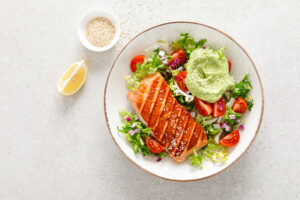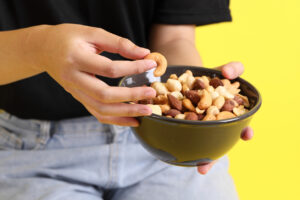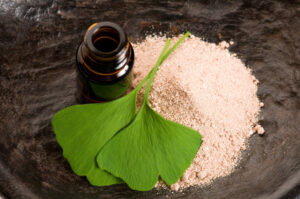Can diet and supplements help manage PMS? Rob Hobson, a Registered Sports Nutritionist who works with the Healthspan supplement brand, tackles whether supplements and diet can help with PMS
Premenstrual syndrome (PMS) represents a significant cause of various physical, emotional, and social challenges experienced by numerous women of reproductive age before their menstrual period.
The range of symptoms includes, but is not limited to, emotional disturbances such as mood fluctuations, depression, irritability, and anxiety, as well as physical cravings leading to increased appetite, desires for sugary foods, fatigue, and headaches.
Premenstrual syndrome (PMS) represents a significant cause of various physical, emotional, and social challenges
A considerable number of women, typically between eight to 20 per cent, encounter such intense symptoms that they seek medical intervention. Treatments often involve hormonal regulation through contraceptives or, in some cases, antidepressants to boost serotonin levels in the brain, enhancing overall mood.
Origins of PMS
The precise cause of PMS remains elusive, though it’s believed to stem from hormonal shifts within each menstrual cycle, particularly the release of progesterone from the ovaries.
This hormone is suspected of triggering symptoms through its interaction with brain chemicals. The role of micronutrients and essential fatty acids has also been scrutinised, with research focusing on their potential benefits for those suffering from PMS.
Despite PMS being dismissed by some due to the lack of observable differences in hormone levels between affected and unaffected individuals, it’s increasingly recognised as a condition linked to heightened sensitivity to female hormones rather than the hormone levels themselves.
Inflammation plays a critical role, and women with conditions such as diabetes, irritable bowel syndrome (IBS), or food allergies are found to be more susceptible to PMS.
Managing PMS effectively involves a comprehensive approach that includes dietary adjustments, potential supplementation, and lifestyle modifications to address both physical and emotional symptoms.
READ MORE: The PMS fix proven by science


Dietary Influence on PMS
Diet indeed plays a crucial role in managing PMS. A balanced diet, particularly one that stabilises blood sugar levels through regular, balanced meals and avoids skipping them, is beneficial.
An anti-inflammatory diet that minimises sugar and unhealthy fats while emphasising whole grains, vegetables, lean protein, and healthy fats can significantly alleviate symptoms.
Foods with a low glycaemic load (GL) are particularly recommended due to their high fibre content, helping manage blood sugar fluctuations and hormone levels, potentially easing symptoms like anxiety, irritability, and cravings.
Such a diet not only helps in managing blood sugar but also in reducing inflammation, which could, in turn, lessen PMS symptoms.
Five foods shown to help relieve symptoms of PMS:
Kale
Leafy greens like kale are packed with fibre, aiding in hormone and blood sugar regulation. Kale, rich in calcium, proves beneficial for women experiencing PMS.
These vegetables are also an excellent iron source, combating fatigue and tiredness from dietary deficiencies and menstrual losses. The phytonutrients in vegetables activate the immune system, diminishing inflammation.
Oily Fish
Evidence suggests that the omega-3 fatty acids in oily fish, known for their anti-inflammatory properties, may alleviate menstrual pain. Aim for a few servings per week of fish like salmon, tuna, trout, mackerel, and herring. Oily fish are also among the rare natural sources of vitamin D, deficiency in which is linked to PMS symptoms.
READ MORE: Got depression? Here’s why taking omega 3s could help


Oats
Whole grain cereals, including oats, are rich in thiamine (vitamin B1). Studies indicate a significant reduction in PMS risk (35%) for women with higher intakes of vitamins B1 and B2.
Whole grains provide carbohydrates that aid in the absorption of tryptophan (found in eggs and turkey), essential for producing serotonin, a brain hormone that can help mitigate mood swings and curb sugar cravings.
Red Kidney Beans
Beans, especially red kidney beans, are fibre-rich, supporting weight management and the removal of excess hormones, thereby stabilizing blood sugar. They’re also packed with iron and zinc; deficiencies in these minerals may increase PMS risk.
Cashew Nuts
Cashews are notably high in magnesium, often called nature’s tranquilizer, crucial for alleviating PMS symptoms related to tension and anxiety. Research suggests that women with PMS typically have lower magnesium levels.
Magnesium also aids in converting vitamin B6 into its active form, vital for producing mood-regulating brain chemicals.
READ MORE: Why your body needs magnesium


PMS and Body Weight
An increase in hunger before the menstrual period is common, particularly for those experiencing PMS, attributed to a slight rise in energy needs. However, indulging in inappropriate food choices can lead to unwanted weight gain.
Shifts in oestrogen and progesterone levels decrease serotonin levels, leading to cravings. Excess weight is strongly linked to worsened PMS due to fat cells releasing oestrogen and pro-inflammatory cytokines, contributing to an inflammatory state that may intensify symptoms like pain, mood swings, and fatigue.
The Role of Supplements
While a nutritious diet is paramount, evidence suggests supplements might offer additional benefits in managing PMS. For many, a three-month trial of specific supplements, coupled with a symptom diary, is thought to help two out of three women, but it does take three months to assess the full benefits.
Calcium
Essential for bone health, muscle function, and blood clotting, calcium imbalances may mirror PMS symptoms. The NDNS survey has shown that 22 per cent of teenage girls and 11 per cent of adult women have insufficient intake of calcium from their diet.
Studies indicate that supplementing with calcium can significantly reduce PMS symptoms. A clinical trial of 466 women with moderate to severe PMS found that supplementing with 1200mg of calcium daily for three cycles resulted in a 48 per cent reduction in total symptom symptoms versus 33 per cent with placebo.
22 per cent of teenage girls and 11 per cent of adult women have insufficient intake of calcium
Research shows that changes in the regulation of calcium may cause disturbances in mood and that symptoms of low calcium levels are like those of PMS.
Try: Healthspan Calcium and Vitamin D – £9.86 for 240 tablets
Magnesium
Involved in numerous bodily processes, including energy production and bone health, magnesium may alleviate symptoms like fluid retention, mood disturbances, and pain, particularly in those deficient in this mineral.
In one study, 32 women with PMS were given magnesium or a placebo in a double-blind, randomized design.
The study found that magnesium significantly reduced the total Menstrual Distress Questionnaire score and the cluster ‘negative affect,’ indicating that magnesium supplementation could be an effective treatment for premenstrual symptoms related to mood changes.
Try: BetterYou Magnesium Water – £1.99 per 250ml can


Gingko Biloba
Extracted from gingko biloba leaves, this supplement may reduce inflammation and improve circulation, offering relief from bloating and breast pain associated with PMS.
One study of 165 women with congestive symptoms of PMS, such as bloating and breast pain, were supplemented with Gingko biloba extracts and, after two months of treatment, showed significant improvements, especially in reducing breast symptoms, compared to a placebo.
Try: Healthspan High Strength Gingko Biloba – £13.95 for 180 tablets
Research suggests one tablet (containing 40mg extract) three times per day from day 16 of your menstrual cycle to the 5th day of the next cycle reduces severity of symptoms of PMS.
After the intervention there was a significant decrease in the overall severity of symptoms among the group that took Gingko (23.7%) and the placebo (8.7%).
Vitamin B6
Part of the B vitamin complex, B6 aids in food metabolism and red blood cell production. It’s shown to reduce symptoms related to mood and fatigue by assisting in neurotransmitter synthesis.
B6 aids in food metabolism and red blood cell production
Research suggests taking 50mg daily to help relieve symptoms of PMS. One trial involving 68 women found that supplementing with 50mg daily of B6 for 3 months improved premenstrual emotional symptoms of depression, irritability, and tiredness with compared to a placebo. Emotions symptoms decreased by 69 per cent and physical symptoms by 52% overall.
Evening Primrose Oil
Rich in the anti-inflammatory omega-6 fatty acid GLA, evening primrose oil has been found effective in treating mood-related symptoms, sugar cravings, and breast pain linked to PMS.
One study found that the treatment of PMS was better with a 2g dose of evening primrose oil compared to a 1g daily dose. Evening primrose oil is also beneficial in relieving PMS symptom severity at 4 to 6 months follow-up after treatment.
Try: Ethical and Pure, Viridian Organic Evening Primrose Oil – £21 for 100ml)


Visit www.robhobson.co.uk or @robhobsonnutritionist and Rob also sees private clients.
Like this article? Sign up to our newsletter to get more articles like this delivered straight to your inbox.

